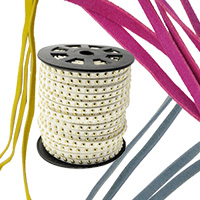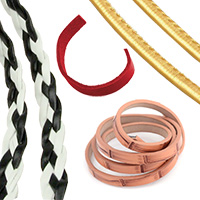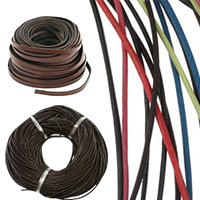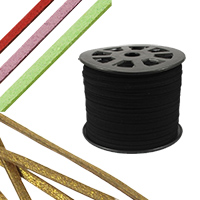Leather and Suede Cords for Jewelry Making and Decorations
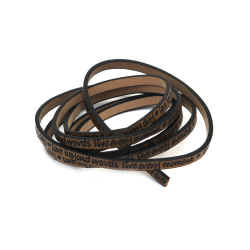
Faux Leather Strip / 5x2 mm / Color: Dark Beige with Inscription - 1.20 meters

Artificial Leather and Textile Strip / 7x2 mm / Blue - 1.20 meters

Faux Leather Cord 10x2 mm, Rose Gold Cat's Eye - 1.20 meters

Artificial Leather Strap / 10x2 mm / Silver Cat's Eye - 1.20 meters

Artificial Leather Cord / 2x1.5 mm / Red - 1.20 meters

Faux Leather Strip / 5x2 mm / Blue, Imitation Snake Skin - 1.20 meters

Artificial Leather Strip / 5x2 mm / Imitation Snake Skin / Pink with Silver ~ 1.40 meters

Eco Leather Cord / 5x3 mm / Imitation Snake Skin, Black Color with Coating - 1.20 meters

Artificial Leather Strap / 5x2 mm / Imitation Snake Skin, Dark Gray Varnish - 1.10 meters

Artificial Leather Strap / 10x2 mm / Black - 1.20 meters
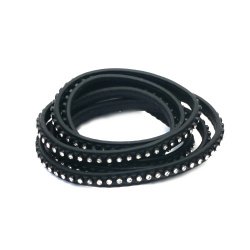
Artificial Leather Strip / 6.5x3.5 mm / Black with Crystals - 1 meter

Faux Leather Cord / 3x2 mm / Beige with Gold Print - 1.20 meters

Faux Leather Cord / 3x2 mm / Light Green with Coating - 1.20 meters

Faux Leather Cord 3x2 mm, Black with Gray and Red print - 1.20 meters
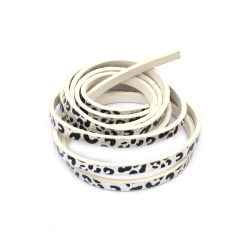
Faux Leather Cord / 5x3 mm / Silver Color with Leopard Print - 1.20 meters
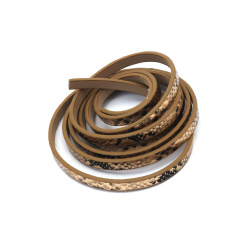
Artificial Leather Strap / 5x3 mm / Imitation Snake Skin / Gold Color - 1.20 meters
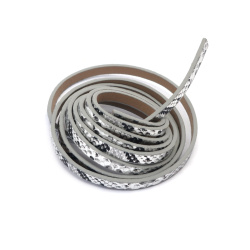
Faux Leather Cord / 5x3 mm / Imitation Snake Skin / Silver Color - 1.20 meters
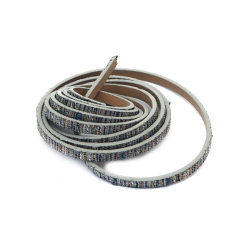
Artificial Leather and Textile Strip / 5x3 mm / ETHNO Motif, Gray Color - 1.20 meters
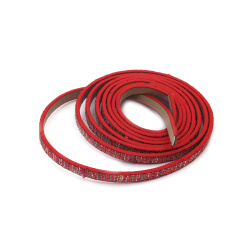
Artificial Leather and Textile Strip / 5x3 mm / ETHNO Motif, Red Color - 1.20 meters
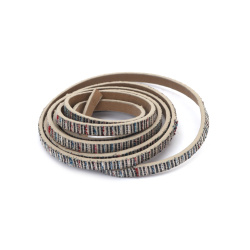
Artificial Leather and Textile Strip / 5x3 mm / ETHNO Motif, Light Gray Color - 1.20 meters
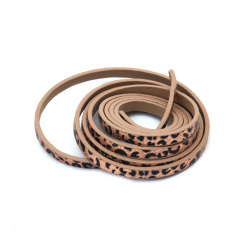
Artificial Leather Strip / 5x3 mm / Rose Gold Color with Leopard Print - 1.20 meters

Artificial Leather Cord / 2x1.5 mm / Black Color with Gold Print - 1.20 meters
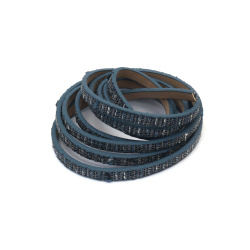
Artificial Leather and Textile Strip / 5x3 mm / ETHNO Motif, Blue Color - 1.20 meters
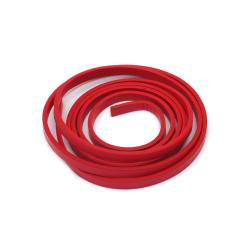
Artificial Leather Lace / 5x2 mm / Red Color - 1.20 meters

Artificial Leather Cord / 2x1.5 mm / Brown - 1.20 meters
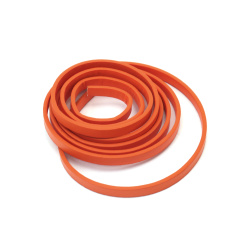
Artificial Leather Strip / 5x2 mm / Orange Color - 1.20 meters

Artificial Leather Strip / 5x2 mm / Watermelon Color - 1.20 meters

Faux Leather Flat Cord / 5x2 mm / Salmon Color - 1.20 meters

Artificial Leather Strip / 5x2 mm / Light Pink Color - 1.20 meters

Faux Leather Flat Cord / 5x2 mm / Dark Violet Color - 1.20 meters

Faux Leather Strip / 5x2 mm / Light Purple Color - 1.20 meters

Artificial Leather Lace / 5x2 mm / Light Brown - 1.20 meters

Artificial Leather Flat Cord / 5x2 mm / Beige Color - 1.20 meters

Artificial Leather Strip / 5x2 mm / Champagne Color - 1.20 meters

Artificial Leather Flat Cord / 5x2 mm / Gray Color - 1.20 meters
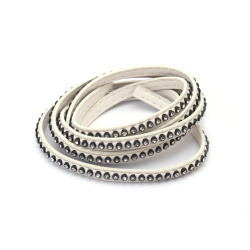
Eco Leather Strap / 6.5x3.5 mm / White with Crystals - 1 meter

Artificial Leather Strip / 5x3 mm / Imitation Snake Skin, Light Blue Color with Coating - 1.20 meters

Faux Leather Strip / 5x3 mm / Imitation Snake Skin / Black, Blue and White Varnish - 1.20 meters
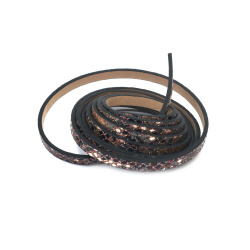
Faux Leather Strip / 5x3 mm / Imitation Snake Skin / Black Color with Glitter Powder - 1.20 meters

Artificial Leather Strip / 5x3 mm / Imitation Snake Skin, Brown, Beige and White Varnish - 1.20 meters

Faux Leather Strap / 10x3 mm / Color: Black with White Stitching - 1 meter
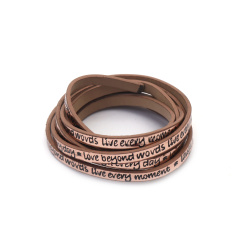
Faux Leather Strip / 5x2 mm / Pink Gold Color with Inscription - 1.20 meters
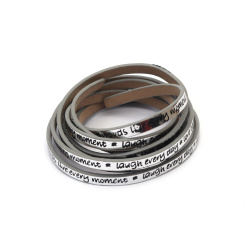
Faux Leather Cord / 5x2 mm / Silver Color with Inscription - 1.20 meters

Artificial Leather Strip 5x2 mm / Dark Blue Color with Glitter Particles - 1.20 meters
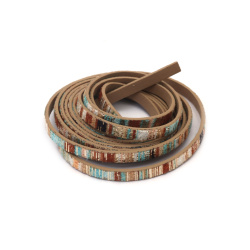
Artificial Leather and Textile Strip / 5x1.5 mm / ETHNO Motif, Colors: Brown, Blue, White and Gold - 1.40 meters
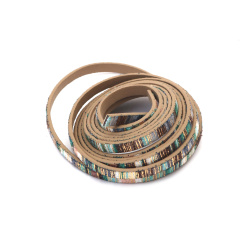
Artificial Leather and Textile Strip / 5x1.5 mm / ETHNO Motif, Colors: Blue, Green, White and Gold - 1.40 meters

Artificial Leather Cord / 2x1.5 mm / Black - 1.20 meters

Faux Leather Trim / 5x2.5 mm / Embossed, Black Color - 1.20 meters
PROPOSALS FROM LEATHER AND SUEDE
Challenge your creative nature with new horizons! Today we invite you to rediscover the beauty and warmth of leather and suede materials. Their use in jewelry making provides incredible design opportunities.
The use of various animal skins, which dates back to prehistoric times, has always had not only a functional but also a purely decorative role. The ancient Romans even made military clothing from it, and Native Americans and Chinese, discovering different ways to process it, turned it into an art form.
Today, designers recreate its beauty and durability in various areas of design – interior, jewelry, watches and accessories, clothes and shoes, bags, wallets, and belts. Following characteristic motifs from ancient cultures, original ethnic jewelry is created. The trends of the summer made us fall in love with the attractive leather and suede cord bracelets.
For the coming months, prepare with larger and bulkier jewelry. Geometric shapes, floral motifs, feathers, folded and intertwined ribbons, fringes – let your imagination run wild!
Take advantage of the wide possibilities of leather and suede to apply different techniques:
- cutting.
- engraving.
- gluing.
- modeling.
Relax and experiment!
Be sure to use specialized quick-drying glues. Their structure should be elastic so as not to damage the surface and shine of the leather and suede.
Use punches for making holes and a hammer with an anvil, to place attractive eyelets yourself. With a few tricks, you can easily control the leather and give it shapes. One way is to soak the prepared pieces according to the design in a mixture of water, alcohol, and liquid soap.
The proportion depends on the thickness and flexibility of the leather and suede. Choose a specific bead shape you would like it to take. Twist it into it and tie it with a strong thread that does not lose color. Then dry at room temperature or speed up the process in an oven up to 60 degrees.
To get volumetric shapes, you can heat the cut pieces of leather. It is good to treat them again with the mixture of water, alcohol, and liquid soap.
Use a small stove and a Teflon pan or a hot air gun to heat them from the face side. Be careful with this method! Take precautions – use tweezers to hold the model and gloves.
Artificial leather is only suitable for jewelry made from cut shapes and knots. If you want to apply more specific and attractive processing techniques, such as heating and soaking, you must use natural leather.
You can find different types according to the intensity of the grain texture and its quality. They are determined by the degree to which the epidermal layer has been removed. Different modeling methods require different thicknesses and flexibility of the pieces. Consider this to achieve successful results!
Perhaps the most common are leather and suede cords. Today, in addition to the classic black and brown, they are now available in a huge number of colors. The variety in sizes is very large, and we at EM ART offer leather and suede cords in a ready-to-wear version – all you have to do is attach the chosen pendant.
Depending on the color and shape of the cord, you can string anything on it – from bone or wood pendants to beaded elements and pendants. You can also use leather and suede cords to make beautiful macrame jewelry.
However, you need to be careful when making more complex Chinese knots with leather cord, especially if it is colored, because there is a risk of damaging the surface. Suede cords, on the other hand, become less resistant to tearing after a certain period of time, so you also need to be careful. You should also keep in mind that leather and suede cords in jewelry intended for everyday use should be replaced relatively often.
For more attractive models, use leather or suede whose fuzzy surface is achieved through a special grinding process. A new non-traditional and ecological approach to the topic is given by the increasingly used fish skins by modern designers.
Care for leather jewelry
Leather jewelry should be carefully protected from dirt, as cleaning them can be very difficult or impossible. Choose cleaning products that do not remove the natural shine of the leather. Test the product first on a small hidden area.
Observe if the leather will change its color and surface. If everything is fine – go ahead! To improve the appearance of worn leather jewelry, use balms with fats and oils.
They naturally penetrate the pores of the leather and restore its flexibility. Do not use products that contain petroleum and mineral oils – they can permanently damage the appearance of your jewelry.
A trick that you can easily use at home to refresh your jewelry is to apply a thin layer of the previously prepared mixture of water, alcohol, and dish soap. The proportion of the individual components depends on the thickness of the leather being treated.
To preserve the attractive appearance of the leather longer, do not wet the jewelry and keep them away from heat sources.
Suede
Some people perceive suede as leather turned inside out, and this is exactly so, with the difference that to have suede as a result, a special treatment of the inner side of the leather is necessary until soft and clearly visible smooth fibers are obtained. The most commonly used source for making suede is calfskin, but it can also be made from sheepskin, goatskin, pigs, and other types of leather.
Suede is produced by sandblasting the inner surface of the leather. This gives it a velvety softness, but it also makes it less resistant to scratches and stains.
People often accuse suede of being a more vulnerable material to moisture. This is a mistake because, as we said, suede is made from the inner side of the leather, which makes it just as water-resistant as any other type of leather.
Proper care for suede is extremely important to preserve its shape and appearance for a longer period. To keep suede fluffy as in its original appearance, it is good to brush it with a special brush, which will prevent the flattening and improper appearance of its texture.
Difference between artificial and natural leather
Natural leather is one of the first materials used in daily life, as it was the most accessible and multifunctional. All parts of the animals raised were used – the meat for food, and the skin respectively for making clothes, shoes, or jewelry. Of course, many changes have occurred to this day, but the basis remains – natural animal leather.
Bags, shoes, and accessories made of natural leather evoke an impression and feeling of luxury, quality, and durability. Naturally, this is completely understandable, considering its properties. It is durable and with proper care can serve faithfully (sometimes for decades!), it also softens over time and shapes according to the needs of the user, which is extremely convenient and preferred in everyday life.
Artificial leather is often considered a low-quality material for the production of shoes and accessories, a cheap substitute for natural leather, but this is far from the truth. Synthetic materials have their advantages, which should not be underestimated.
There are many types of synthetic leather, but we could group them into two main types – polyurethane and PVC. The former is characterized by greater flexibility and breathability (i.e., breathable), and the latter – by greater strength and moisture resistance.
Eco-leather is produced artificially and therefore no animals are used to obtain it. It is resistant to weather conditions, making it an excellent choice for producing shoes for the autumn-winter period.
Advantages of natural leather:
- Luxurious feel.
- Pleasant to the touch.
- Relaxes over time.
- Durable in use.
Advantages of artificial leather:
- More affordable price.
- Water and fade resistant.
- Not made from animals.
- Precision of color and fine detail.
After reviewing the main characteristics of natural and artificial leather, as well as their advantages and disadvantages, it is time to give tips on how to distinguish them in practice. Although these tips are more relevant when shopping offline, there are also some tricks to distinguish natural from artificial leather when shopping online.
Smell
Natural leather smells... well, like leather. Artificial leather usually has a smell of plastic or something chemical. Of course, this is not a 100% guarantee, but it is a fairly reliable way to judge whether the store’s claims are true.
Appearance
When looking closely at the leather itself, pores and wrinkles are noticeable. If they are symmetrical, with equal depth, and practically identical – it is most likely a synthetic material. Eco-leather products can achieve uniformity of pores, as well as color, thanks to machine production.
With natural leather, pores and wrinkles are random and depend entirely on the characteristics of the animal from which it was obtained. The color is also more sensitive, but significant differences are rarely noticeable at the time of initial purchase. With both types of leather, color changes may occur when folded, but with artificial leather, wrinkles are noticeable almost immediately, while with natural leather it takes more time.
Inside
Look at the product (shoe, bag, jewelry, etc.) from the inside. If there is no additional lining, the differences can be easily seen. With natural leather, the inside is not smooth and even, often resembling suede or at least being fuzzy. Synthetic leathers usually have a textile interior.
Water
Natural leather absorbs water very quickly. This is a completely normal reaction and for this reason, shoes and bags should be protected from moisture with special impregnating products. Eco-leather repels water almost immediately and it simply slides off its surface.
Price
In some cases, the price can be an indicator, but not always. Generally, products made of natural leather are more expensive due to their qualities and durability, but it is often possible to see similar and even higher prices for products made of synthetic leather.
Regardless of which type of leather you have chosen, it is important to take care of your shoes, bags, belts, and other accessories in the appropriate way and to wear them with pleasure.
One main “disadvantage” of leather products is in the realm of moral principles. Many environmentalists fight against the production of natural leather products to preserve animal species and offer eco-leather as an alternative.
In fact, the market now offers very well-made accessories from eco-leather that successfully imitate the natural one and are at much more affordable prices. Many people still avoid eco-leather out of fear that it is not durable and will wear out easily, which is not entirely true.
How long eco-leather will last depends on its thickness – the thicker it is, the harder it will be to wear out.
Eco-leather is rapidly gaining popularity in the fashion industry, so it won’t be difficult to find a variety of eco-leather items.
Advantages and disadvantages of suede
Products made from this material are popular for every season. They are comfortable and look stylish. Many consider the high price of the material to be a disadvantage.
But the price, fortunately, justifies the quality. You can highlight several advantages of clothes, bags, shoes, and jewelry made from this material:
- Elegant appearance
- Complement any image
- High-quality products
- Jewelry made from this material is considered more comfortable as it quickly takes shape but does not stretch or deform.
The disadvantages include the difficult care of suede items. However, on the other hand, every quality product requires appropriate care. So if you follow the care instructions, you can enjoy the original look of your suede jewelry and creations for a long time.
For care, you will need special brushes. It is recommended to protect suede surfaces with a special spray to preserve their beauty for longer. If your suede temptations start to lose color, then special dyes and creams for suede will come to the rescue.
Suede products can be washed with soap and water and then wiped with a soft cloth. Do not dry in the sun!
Pay attention
The earlier popular advice to set a product made of leather or suede on fire to determine its authenticity no longer works. Now substitutes also char perfectly, so you can no longer distinguish them. In addition, everyone knows that suede smells strongly, so manufacturers now treat artificial products with special sprays.
Good advice
Although good suede products are now often coated with special dirt and dust repellents, you still need to be careful when wearing them. Suede does not like moisture: if caught in the rain, be sure to dry your shoes, fill them with paper, and hang your raincoat on hangers, but not near a heater or especially over a fire.
Contaminants should be removed as soon as possible with a special suede brush or at least with an ordinary eraser.

